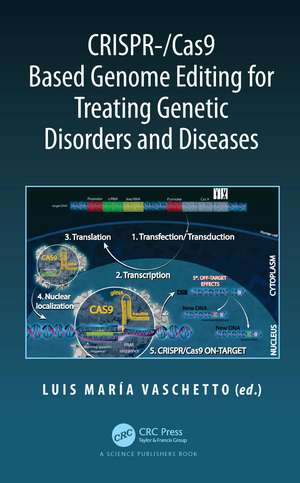CRISPR-/Cas9 Based Genome Editing for Treating Genetic Disorders and Diseases
Autor Luis María Vaschettoen Limba Engleză Hardback – 31 ian 2022
| Toate formatele și edițiile | Preț | Express |
|---|---|---|
| Paperback (1) | 436.14 lei 6-8 săpt. | |
| CRC Press – 27 mai 2024 | 436.14 lei 6-8 săpt. | |
| Hardback (1) | 910.52 lei 6-8 săpt. | |
| CRC Press – 31 ian 2022 | 910.52 lei 6-8 săpt. |
Preț: 910.52 lei
Preț vechi: 958.44 lei
-5% Nou
174.25€ • 181.25$ • 143.85£
Carte tipărită la comandă
Livrare economică 14-28 aprilie
Specificații
ISBN-10: 0367542862
Pagini: 268
Ilustrații: 15 Tables, black and white; 3 Illustrations, color; 12 Illustrations, black and white
Dimensiuni: 156 x 234 x 20 mm
Greutate: 0.55 kg
Ediția:1
Editura: CRC Press
Colecția CRC Press
Notă biografică
Cuprins
Recenzii
pages in the book are devoted to references. This book offers an excellent starting point for exploration of genome editing in humans and is highly recommended.'
- Mark F. Sanders, PhD, UC Davis College of Biological Sciences
Descriere
The CRISPR-Cas9 genome-editing system is creating a revolution in the science world. In the laboratory, CRISPR-Cas9 can efficiently be used to target specific genes, correct mutations and regulate gene expression of a wide array of cells and organisms, including human cells. CRISPR-/Cas9 Based Genome Editing for Treating Genetic Disorders and Diseases is a unique reading material for college students, academicians, and other health professionals interested in learning about the broad range of applications of CRISPR/Cas9 genetic scissors. Some topics included in this book are: the role of the CRISPR/Cas9 system in neuroscience, gene therapy, epigenome editing, genome mapping, cancer, virus infection control strategies, regulatory challenges and bioethical considerations.
